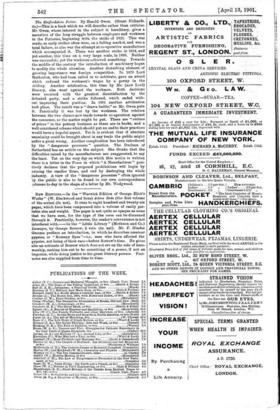The Staffordshire Potter. By Harold Owen. (Grant Richards. 6s.)—This is
a book which we will describe rather than criticise. Mr. Owen, whose interest in the subject is hereditary, gives a narrative of the long struggle between employers and workmen in the Potteries, beginning with the strike of 1825. This was made, as early strikes often were, on a falling market, and was a total failure, as also was the attempt at co-operative manufacture which accompanied it. There was another strike in 1834, and yet another, this time on a very large scale, in 1836. Neither was successful; yet the workmen r-chieved something. Towards the middle of the century the introduction of machinery began to modify the whole situation. Another disturbing element of growing importance was foreign competition. In 1879 Lord Hatherton, who had been called in to arbitrate, gave an award which reduced the workmen's wages by a penny in the ihilling. Another arbitration, this time by Mr. (now Lord) Brassey, also went against the workmen. Both decisions were recsived with the greatest dissatisfaction by the defeated party, and a strike followed, which ended with- out improving their position. In 1891 another arbitration took place. The result was a "drawn battle," as Mr. Owen puts it. Practically it was lost by the workmen. The relation between the two classes now tends towards co-operation against the consumer, as the matter might be put. There are "cutters of prices" in the pottery business as there are in books, and a well-considered scheme which should put an end to their practices would have a hopeful aspect. Yet it is evident that if absolute unanimity could be brought about in any trade the public might suffer a great wrong. Another complication has been introduced by the " dangerous processes" question. The Duchess of Sutherland has an article on the subject. She thinks that the difficulties raised by the manufacturers are exaggerated, to say the least. Yet on the very day on which this notice is written there is a letter in the Times in which "A Manufacturer" posi- tively declares that the proposed prohibitions will begin by ruining the smaller firms, and end by destroying the whole industry. A view of the "dangerous processes" often ignored -ay ,the public is also to be found in our own correspondence columns to-day in the shape of a letter by Mr. Wedgwood.






































 Previous page
Previous page